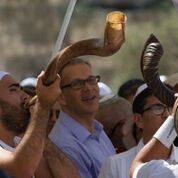The High Holy Days in Israel
(Written by CPM staff)
The High Holy Days in Israel
Cultures all around the world celebrate the beginning of a new year with festivity and celebration. Whether it’s New Year’s Eve in New York City or Chinese New Year in Beijing, it is a time of joy and celebration.
The Jewish observance of the Jewish New Year (Rosh Hashana) is no different – it’s a time of joy. However, after this festive observance, the Jewish calendar transitions to what is called the 10 Days of Awe, a reverent time of prayer and reflection leading to the holiest day of the year, Yom Kippur, the Day of Atonement. What a contrast to what we may be accustomed to when entering a new calendar year.
These Days of Awe, also called the Days of Repentance, mark the beginning of an important season for every Jewish person around the world – the High Holy Days. These ten days are a bridge between the Jewish New Year (Rosh Hashanah) and the Day of Atonement (Yom Kippur). The Feast of Tabernacles (Sukkot) follows this time of personal penitence and introspection in an eight-day festive holiday concluding with Simchat Torah (Joy of the Torah).
During the High Holidays, Jewish people from around the world visit Israel to honour this holiest season of the year. Despite the crowds, Jerusalem becomes a city of contemplation rather than its usual intensely urban busyness.
Piercing Sound in the Air
In Israel, and Jerusalem especially, the piercing sound of the shofar (a large ram’s horn used for ceremonial purposes) regularly interrupts the tranquil atmosphere of the season. In fact, the term “New Year” is not even used in the Bible; this first holy day is referred to in the Scriptures as Yom Teruah – the Day of Trumpets. The shofar reminds Jewish people of the obedience of Abraham, who was willing to offer his only son as a sacrifice to God. The Lord stopped Abraham before he went through with the act, providing a ram as a substitute for the sacrifice of Isaac.
The sound of the shofar reminds the Jewish people that the Day of Atonement is approaching. According to the tradition, God opens the Book of Life on Rosh Hashanah and closes it on Yom Kippur, making it the defining period for Jewish people to make amends and seek forgiveness from God and man. To a fault, Israelis will reach out to family, friends and acquaintances to apologize, restore broken relationships and “make things right” – all done in hopes of pleasing God.
The traditional greeting on Rosh Hashanah is “May your name be inscribed in the Book of Life” and Israelis wish one another “a sweet new year.” This hope for sweet days ahead is expressed by symbolically dipping apples in honey and eat ing dessert. The traditional oblong braided Shabbat challah (bread) is replaced by a festive round challah, baked with raisins to symbolize the circle of life and the sweetness of the New Year. This is a wonderful opportunity for us to talk to our Jewish friends and family about the Book of Life and what ensures our inclusion on its pages. Jesus the Messiah not only is the single guarantee to have our names inscribed in it, but He also offers us access to forgiveness of sin on any day of the year and not just during the Days of Awe!
ing dessert. The traditional oblong braided Shabbat challah (bread) is replaced by a festive round challah, baked with raisins to symbolize the circle of life and the sweetness of the New Year. This is a wonderful opportunity for us to talk to our Jewish friends and family about the Book of Life and what ensures our inclusion on its pages. Jesus the Messiah not only is the single guarantee to have our names inscribed in it, but He also offers us access to forgiveness of sin on any day of the year and not just during the Days of Awe!
The Holiest of Days
Most Jewish people understand that repentance is the path that leads to forgiveness of sin, and during this season Jewish people are particularly mindful of this possibility. Yet, the Bible never tells us that repentance alone leads to forgiveness, as the Lord determined that blood must be shed for the forgiveness of sin (Leviticus 17:11). The Day of Atonement is a prophetic portrait of the ultimate sacrifice made by Jesus the Messiah for the sins of both Jews and Gentiles. The sacrificial system and Levitical priesthood of the First and Second Temples pointed to the sacrifice of God’s Son, as on Yom Kippur, the Day of Atonement, the High Priest would slip behind the curtain separating the Holy Place from the Holy of Holies and offer the blood of the sacrifice to make atonement for sins.
Most Jewish people around the world cease from all work on Yom Kippur. In Israel, it is the only day of the year when even the international airport in Tel Aviv becomes still and quiet. Most of the nation abstains from eating, driving, commerce and social media. Entire families choose to pray at the Western Wall in the Old City of Jerusalem, where the Temple once stood, to beg God for His mercy.
Even the sincerest Jewish person still needs to discover that forgiveness of sin is a gift that God grants when one accepts Jesus the Messiah who made atonement on our behalf through His perfect life and sacrificial death. He is the suffering servant of Isaiah 53 and the Lamb of God who takes away the sin of the world, fulfilling the Festival of Yom Kippur.
Frailty of Life on Earth
Less than a week after the Days of Awe, which conclude at Yom Kippur, we begin to celebrate Sukkot, the Feast of Tabernacles (Leviticus 23:34-36, 39-44), which is a far more jubilant holiday. It is one of the three pilgrimage holidays when the head of the family is commanded to travel to Jerusalem to celebrate the festival before the Lord (Ex 23:14). The Feast of Tabernacles reminds us of the frailty of human life and that our joy comes when we completely depend upon God.
God tells His people in several parts of the Torah to rejoice during this Festival. It is a command! Moses writes,
“Be joyful at your festival—you, your sons and daughters, your male and female servants, and the Levites, the foreigners, the fatherless and the widows who live in your towns. For seven days celebrate the festival to the LORD your God at the place the LORD will choose. For the LORD your God will bless you in all your harvest and in all the work of your hands, and your joy will be complete.” (Deut. 16:14-15)
Jewish people set up sukkahs, special booths, in their gardens, on their patios or balconies and eat their meals there. Some decide to spend the nights in the “booths” as well, to keep the commandment recorded in Leviticus 23:42-43. Jewish people forego their usual comfort to remember their wandering through the desert, living in tents and looking to the Lord in every need or challenge.
The Feast of Tabernacles celebrates the ingathering of the harvest, and as such it foreshadows the regathering of the people of Israel. The Prophet Zechariah envisions the nations of the world submitting themselves to the Lord and enjoying the grace and mercy found within God’s future tabernacle (Zech. 14:16-21). This is the fulfilment of God’s promise to Abram that the world would be blessed through the Jewish people (Genesis 12:3).
Joy of the Torah
Jewish tradition divides the reading of the Five Books of Moses (the Torah) in the Synagogue into 54 portions. All around the world Jewish people read the same part of Scripture on Saturday – the Sabbath. The day after Sukkot is when Jewish people celebrate a Festival that is part of a Jewish tradition called Simchat Torah, which adds greatly to the joy of the season. 
On the night of Simchat Torah (the Joy of the Torah) Jews in synagogues read that last portion for the year – Moses’ blessings over the tribes at the end of Deuteronomy, only to turn the scroll back to the very beginning in Genesis, to passages on God creating the world. The symbolic transition from the end to the beginning points to the fact that the study of God’s Word has no end and is always relevant. The streets and synagogues throughout Israel are filled with singing and dancing, in celebration of God’s gift in the form of the Torah.
The portions of God’s Word selected for each Saturday’s reading include passages from all three sections of the Bible: from the Torah, the Writings and the Prophets. Universal for both Israel and the Diaspora, Jewish people unite over their collective calling and responsibility to study and teach the Scriptures, as the chosen people of God.
The Festivals of Israel are a roadmap to redemption! They are prophecies in type and point to a great fulfilment through the Messiah, whom we believe is Jesus of Nazareth. In Him, all the festivals of Israel are fulfilled. He said this Himself when he spoke to the two men accompanying Him on the road to Emmaus,
And He said to them, “O foolish men and slow of heart to believe in all that the prophets have spoken! Was it not necessary for the Christ to suffer these things and to enter into His glory?” Then beginning with Moses and with all the prophets, He explained to them the things concerning Himself in all the Scriptures. (Luke 24:25-27)
We pray that our Jewish people will recognize that He is the way, the truth and the life and one fulfilment of all the law and the prophets (Matthew 5:17-18). Would you pray with us?
Lord God of Abraham, Isaac and Jacob, please open the eyes and hearts of your chosen people and reveal Yeshua the Messiah to every seeking heart. Please use this season of the High Holidays to bring many of your beloved Jewish people to salvation through our Messiah Jesus. Amen!

